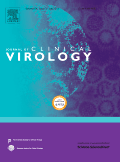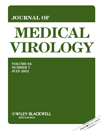
JOURNAL OF CLINICAL VIROLOGY
Scope & Guideline
Advancing the Frontiers of Viral Research
Introduction
Aims and Scopes
- Clinical Diagnostics and Monitoring:
The journal emphasizes the development and evaluation of diagnostic assays for viral infections, including real-time PCR, serological tests, and point-of-care testing, aiming to improve early detection and monitoring of viral diseases. - Epidemiological Studies:
The journal covers a wide range of studies related to the epidemiology of viral infections, including outbreak investigations, seroprevalence studies, and the evolution of viral pathogens, providing critical insights into the spread and control of viral diseases. - Viral Pathogenesis and Treatment:
Research on the mechanisms of viral pathogenesis, host response, and the effectiveness of antiviral treatments is a core focus, facilitating a better understanding of how viruses affect human health and how to combat them. - Vaccine Development and Immunogenicity:
The journal publishes studies on vaccine efficacy, safety, immunogenicity, and the impact of vaccination on viral transmission, particularly in the context of emerging viral threats. - Emerging and Re-emerging Viruses:
There is a strong emphasis on research related to newly identified viruses and the resurgence of previously controlled viral infections, reflecting the journal's commitment to addressing global health challenges.
Trending and Emerging
- COVID-19 Research:
A significant increase in research related to SARS-CoV-2, including studies on diagnostics, treatment, vaccine efficacy, and epidemiological impacts, underscores the pandemic's influence on the field. - Molecular Diagnostics and Point-of-Care Testing:
There is a notable trend towards developing and validating rapid, sensitive molecular diagnostic tests, including point-of-care assays that enhance accessibility and speed of viral detection. - Viral Genomics and Evolution:
The journal is witnessing a rise in studies focused on viral genomics, phylogenetics, and the evolutionary dynamics of viruses, which are crucial for understanding outbreaks and developing targeted interventions. - Immunology and Host Response:
Research exploring the immune response to viral infections and the implications for treatment strategies has gained traction, particularly in the context of vaccine development and immunotherapy. - Global Health and One Health Approach:
Emerging studies that adopt a One Health perspective, integrating human, animal, and environmental health in the context of viral infections, are becoming increasingly relevant, reflecting a holistic approach to addressing viral threats.
Declining or Waning
- Traditional Virology Techniques:
Over the years, there has been a decline in studies focusing solely on traditional virology techniques, such as basic culture and isolation methods, as the field moves towards more advanced molecular techniques and rapid diagnostics. - Non-Viral Co-Infections:
Research on co-infections with non-viral pathogens has become less prominent, as the focus has shifted to understanding the specific impacts and management of viral infections, particularly in the context of COVID-19. - Historical Epidemiological Studies:
There has been a noticeable reduction in the publication of retrospective studies on historical viral outbreaks, as current research increasingly prioritizes real-time data and responses to ongoing viral threats.
Similar Journals

Frontiers in Virology
Connecting Researchers for Global Viral SolutionsFrontiers in Virology, published by FRONTIERS MEDIA SA, is an innovative open-access journal dedicated to advancing the understanding of viral biology, pathogenesis, surveillance, and control strategies. With the rapid evolution of viral threats, this journal serves as a critical platform for researchers, professionals, and students to disseminate and access high-quality research, reviews, and perspectives in virology. The journal places a strong emphasis on interdisciplinary approaches, promoting collaborative efforts that drive breakthroughs in the field. While the specific impact factor and H-index details are currently unavailable, Frontiers in Virology is committed to rigorous peer review and integrity in scientific publishing. Authors and readers will benefit from the extensive reach provided by open access, making groundbreaking insights available to a global audience, thus contributing significantly to the ongoing dialogue in virology and public health.

Advances in Virology
Advancing Knowledge, Transforming VirologyAdvances in Virology, an esteemed journal published by HINDAWI LTD, serves as a pivotal platform for cutting-edge research in the field of virology and infectious diseases. With its ISSN 1687-8639 and E-ISSN 1687-8647, the journal has been a significant contributor to the scientific community since its initiation as an Open Access resource in 2009, allowing researchers from around the globe to access groundbreaking findings without barriers. Operating out of the United States and recognized for its commitment to high-quality research, the journal's relevance is underscored by its ranking in the Q3 category for Infectious Diseases and Q4 for Virology as of 2023. The time frame of publications spans from 2009 to 2024, reflecting a continuous commitment to exploring the evolving landscape of virology. This journal not only promotes the dissemination of novel insights and methodologies but also fosters collaboration and innovation within the scientific community, making it an invaluable resource for researchers, professionals, and students alike.

Viruses-Basel
Advancing the Frontiers of Virology ResearchViruses-Basel, published by MDPI, is a leading interdisciplinary journal focused on the field of virology and infectious diseases, offering a platform for the rapid dissemination of high-quality research. Established in 2009, this open access journal has become an essential resource for researchers and health professionals, ensuring that critical findings are readily available to a global audience. With an impressive Q1 ranking in Infectious Diseases and a Q2 ranking in Virology as of 2023, the journal reflects its commitment to impactful research, validated by its notable positions within Scopus categories—ranked #84 out of 344 in Medicine: Infectious Diseases and #27 out of 80 in Immunology and Microbiology: Virology. The journal adheres to high standards of academic rigor, and by embracing an open access model, it promotes unrestricted access to scientific knowledge, fostering collaboration among researchers, professionals, and students alike. Situated in Basel, Switzerland, the journal serves as a cornerstone in the dissemination of research findings related to viral diseases and their implications on public health.

ACTA VIROLOGICA
Pioneering knowledge in viral diagnostics and treatment.ACTA VIROLOGICA, a key journal in the field of virology and infectious diseases, is published by FRONTIERS MEDIA SA in Slovakia, serving the global scientific community with groundbreaking research since its inception in 1957. This esteemed journal, identified by ISSN 0001-723X and E-ISSN 1336-2305, provides a platform for rigorous peer-reviewed articles that contribute significantly to our understanding of viral pathogens and their implications in medicine. Positioned within the Q3 category for both Infectious Diseases and Miscellaneous Medicine, and a Q4 category for Virology in 2023, ACTA VIROLOGICA offers crucial insights into the evolving landscape of virology research. With its robust accessibility options, this journal appeals to a diverse readership, including researchers, healthcare professionals, and students, fostering a collaborative environment to advance the field of virology. The editorial objective is to enhance the catalog of knowledge pertaining to viruses, promoting innovative approaches in prevention, diagnostics, and treatment. Located at AVENUE DU TRIBUNAL FEDERAL 34, LAUSANNE CH-1015, SWITZERLAND, ACTA VIROLOGICA continues to be a vital resource in the collective efforts to combat viral disease challenges.

Hepatitis Monthly
Connecting researchers to reshape hepatitis care.Hepatitis Monthly, published by BRIEFLAND in the Netherlands, is a pivotal journal in the fields of hepatology and infectious diseases. Established in 2007, it continues to make significant contributions to the understanding and management of hepatitis and related viral infections with a publication timeline extending through to 2024. Aiming to disseminate high-quality research, the journal serves as a forum for groundbreaking studies and innovations essential for healthcare professionals, researchers, and students alike. While it currently holds Q4 rankings in both hepatology and infectious disease categories, its ongoing commitment to addressing pressing health issues makes it an important resource in the academic community. Although it operates under a traditional access model, Hepatitis Monthly not only publishes original research articles, reviews, and case studies but also encourages the exchange of knowledge that helps shape future research directions and clinical practices. As it continues to explore the complexities surrounding viral hepatitis, this journal invites researchers to contribute to its mission of advancing scientific understanding and improving patient care.

JOURNAL OF MEDICAL VIROLOGY
Elevating Research Standards: A Premier Source in Medical Virology.JOURNAL OF MEDICAL VIROLOGY is a prestigious academic publication dedicated to advancing the field of virology and infectious diseases. Published by WILEY, this journal has established itself as a cornerstone within the scientific community since its inception in 1977, and it will continue to provide cutting-edge research until 2024. With an impressive impact factor that places it in the Q1 quartile for both Infectious Diseases and Virology, the journal ranks 14 out of 344 in Medicine - Infectious Diseases and 6 out of 80 in Immunology and Microbiology - Virology according to Scopus metrics. Its focus encompasses a broad spectrum of topics, including viral pathogenesis, diagnostics, treatment strategies, and epidemiology, making it an essential resource for researchers, clinicians, and students alike. Although not an open-access journal, it provides valuable insights and accessible content for subscribers and libraries. The ongoing commitment to high-quality peer-reviewed articles makes JOURNAL OF MEDICAL VIROLOGY a vital platform for disseminating knowledge and fostering innovation in virology and related fields.

VIROLOGICA SINICA
Fostering Academic Excellence in Virology StudiesVIROLOGICA SINICA, published by KEAI PUBLISHING LTD, is a leading international journal dedicated to the field of virology. With an ISSN of 1674-0769 and E-ISSN of 1995-820X, this esteemed journal showcases cutting-edge research from 2006 to 2024, focusing on critical developments in Immunology, Infectious Diseases, Molecular Medicine, and Virology. As evidenced by its respectable positioning in the Q2 quartile of relevant categories and impressive Scopus rankings—such as Rank #20/80 in Virology—VIROLOGICA SINICA serves as an essential resource for researchers, professionals, and students aiming to deepen their understanding of viral pathogens and their impact on human health. While the journal does not currently offer open access, it remains an invaluable publication for those seeking to stay at the forefront of virology research. Its address is located at 16 Donghuangchenggen North St, Beijing, China, where it continues to foster academic excellence in the rapidly evolving landscape of virology.

VIRUS GENES
Pioneering Discoveries in Virology and GeneticsVIRUS GENES is an esteemed journal published by Springer, dedicated to advancing our understanding of virology and its related fields, including genetics, molecular biology, and immunology. With a publication history that spans from 1987 to 2024, this journal provides researchers and professionals with a platform to disseminate high-quality, peer-reviewed articles that explore the intricacies of viral genetics and their implications in health and disease. With an impact factor placing it in the Q3 quartile across multiple categories in 2023, including Genetics and Virology, VIRUS GENES serves as a crucial resource for academics seeking to stay at the forefront of viral research. Its commitment to showcasing innovative research makes it an invaluable asset for students and professionals aiming to deepen their knowledge in the rapidly evolving landscape of virology. Although currently not offering Open Access, the journal ensures wide accessibility through institutional subscriptions, thereby playing a vital role in the collaboration between scientists globally.

Food and Environmental Virology
Pioneering Insights into Food Safety and Environmental SustainabilityFood and Environmental Virology is a distinguished journal published by SPRINGER, focusing on the intersection of virology, food science, and environmental health. With its ISSN 1867-0334 and E-ISSN 1867-0342, this journal stands out for its contributions to the understanding of viral pathogens affecting food safety and environmental sustainability. Operating from its esteemed location in New York, USA, the journal has made significant strides since its inception in 2009, with a converged publication period extending to 2024. It currently holds a commendable position within various categories, ranking Q3 in Epidemiology and Virology and Q2 in both Food Science and Health, Toxicology and Mutagenesis, indicating its crucial role in informing both research and policy in these fields. With impressive Scopus rankings—such as 82nd out of 389 in Food Science and 38th out of 148 in Epidemiology—Food and Environmental Virology continues to be a vital resource for researchers, professionals, and students committed to advancing knowledge and practices around food safety and public health. While it operates under a subscription model, the rigorous peer-review process ensures that only high-quality research is published, maintaining the journal’s integrity and relevance in the scientific community.

VIRUS RESEARCH
Exploring innovative therapeutic strategies against viruses.VIRUS RESEARCH is a leading journal dedicated to the field of virology, published by Elsevier, and has been a cornerstone for researchers, professionals, and students since its inception in 1984. With an impressive impact factor, the journal is highly regarded, holding a Q2 category ranking in both Cancer Research and Infectious Diseases, as well as in Virology for 2023. Based in the Netherlands, it publishes high-quality, peer-reviewed articles that explore the intricate relationships between viruses and their hosts, novel therapeutic strategies, and advancements in virus biology. Researchers will find that it ranks 49th in Medicine - Infectious Diseases and 19th in Immunology and Microbiology - Virology according to Scopus, signifying its significant contribution and relevance in the academic world. VIRUS RESEARCH facilitates a platform for sharing groundbreaking discoveries, forming a vital part of the global scientific community, making it an essential read for those involved in the study of viral pathogens and their implications in medicine and biochemistry.